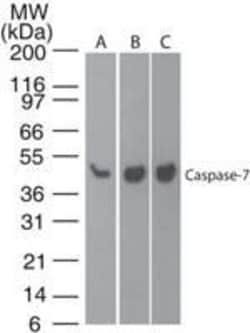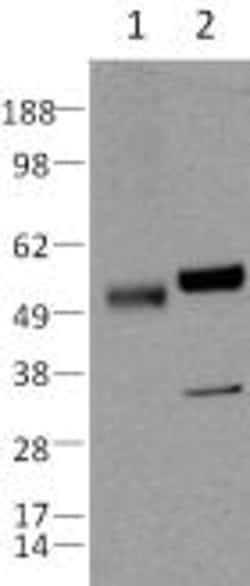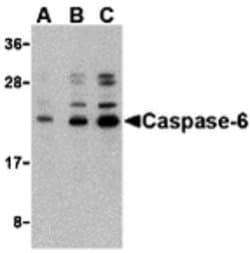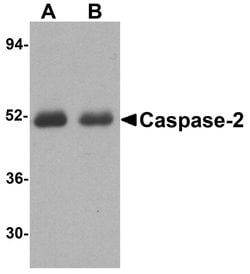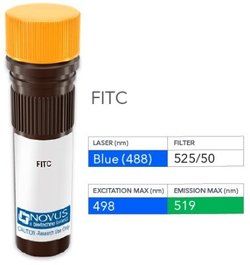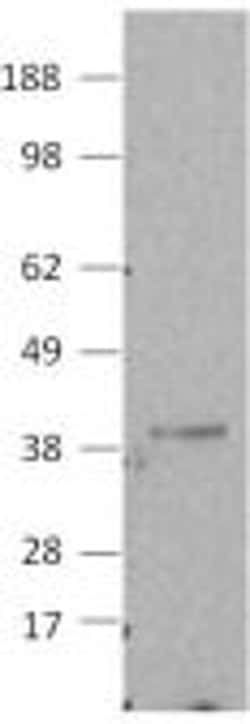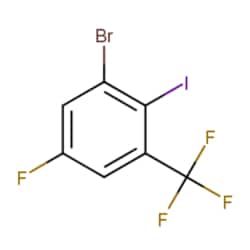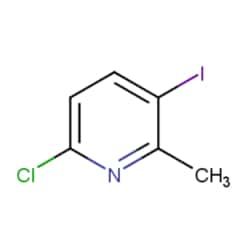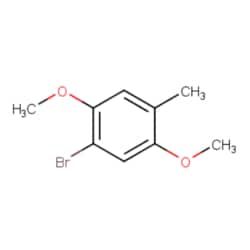50-138-90
Caspase 7 Monoclonal Antibody (20F3), eBioscience™, Invitrogen™
Manufacturer: Invitrogen
Select a Size
| Pack Size | SKU | Availability | Price |
|---|---|---|---|
| Each of 1 | 50-138-90-Each-of-1 | In Stock | ₹ 14,151.00 |
50-138-90 - Each of 1
In Stock
Quantity
1
Base Price: ₹ 14,151.00
GST (18%): ₹ 2,547.18
Total Price: ₹ 16,698.18
Antigen
Caspase 7
Classification
Monoclonal
Concentration
0.5 mg/mL
Formulation
PBS with 0.09% sodium azide; pH 7.2
Gene Accession No.
P55210
Gene Symbols
CASP7
Purification Method
Affinity chromatography
Regulatory Status
RUO
Gene ID (Entrez)
840
Content And Storage
4° C
Form
Liquid
Applications
Western Blot
Clone
20F3
Conjugate
Unconjugated
Gene
CASP7
Gene Alias
AI314680; Apoptotic protease Mch-3; Casp7; CASP-7; caspase 7; caspase 7, apoptosis-related cysteine peptidase; caspase 7, apoptosis-related cysteine protease; caspase-7; Caspase-7 subunit p11; Caspase-7 subunit p20; CMH-1; cysteine protease LICE2; ICE-IAP3; ICE-LAP3; ICE-like apoptotic protease 3; Lice2; mCASP-7; MCH3; OTTHUMP00000020511; OTTHUMP00000020513; OTTHUMP00000020514; RP11-211N11.6
Host Species
Rat
Quantity
25 μg
Primary or Secondary
Primary
Target Species
Human
Product Type
Antibody
Isotype
IgG2a
Description
- Description: The monoclonal antibody 20F3 recognizes human caspase-7, also known as mch3 and ICE-LAP3
- It is a member of the cysteine-requiring aspartate protease family, which plays critical roles in cell suicide known as apoptosis
- Along with caspases 3 and 7, this member is categorized as an effector or executioner caspase
- It must first be activated via cleavage by capase 3, 6, or 8 or by granzyme B
- As an effector molecule, caspase-7 is responsible for the demolition phase of apoptosis in that it cleaves PARP and other molecules also cleaved by caspase-3
- This monoclonal antibody can be used to identify both the full-length (p35) and active form (p20) of caspase-7 under reducing conditions by SDS-PAGE
- Applications Reported: This 20F3 antibody has been reported for use in immunoblotting (WB)
- Applications Tested: This 20F3 antibody has been tested by immunoblot analysis of reduced Jurkat cell lysates
- This can be used at 1-5 μg/mL
- It is recommended that the antibody be carefully titrated for optimal performance in the assay of interest
- The presence of a nonspecific band at approximately 58 kDa may be present in some lysates
- Purity: Greater than 90%, as determined by SDS-PAGE
- Aggregation: Less than 10%, as determined by HPLC
- Filtration: 0.2 μm post-manufacturing filtered
- Caspase 7 is part of a family of cysteine proteases that can be divided into the apoptotic and inflammatory caspase subfamilies
- Unlike the apoptotic caspases, members of the inflammatory subfamily are generally not involved in cell death but are associated with the immune response to microbial pathogens
- The apoptotic subfamily can be further divided into initiator caspases, which are activated in response to death signals, and executioner caspases, which are activated by the initiator caspases and are responsible for cleavage of cellular substrates that μgtimately lead to cell death
- Caspase 7 is an executioner caspase that was identified based on its homology with caspases 1 and 3, as well as the C
- elegans cell death protein CED-3
- Alternative splicing of Caspase-7 mRNA results in the production of 3 distinct isoforms
- Caspase-7 activity can be directly inhibited by XIAP expression
- Alternative splicing results in four transcript variants, encoding three distinct isoforms of Caspase 7
- Diseases associated with CASP7 include Type 1 Diabetes Mellitus 17 and Aleutian Mink Disease.
Compare Similar Items
Show Difference
Antigen: Caspase 7
Classification: Monoclonal
Concentration: 0.5 mg/mL
Formulation: PBS with 0.09% sodium azide; pH 7.2
Gene Accession No.: P55210
Gene Symbols: CASP7
Purification Method: Affinity chromatography
Regulatory Status: RUO
Gene ID (Entrez): 840
Content And Storage: 4° C
Form: Liquid
Applications: Western Blot
Clone: 20F3
Conjugate: Unconjugated
Gene: CASP7
Gene Alias: AI314680; Apoptotic protease Mch-3; Casp7; CASP-7; caspase 7; caspase 7, apoptosis-related cysteine peptidase; caspase 7, apoptosis-related cysteine protease; caspase-7; Caspase-7 subunit p11; Caspase-7 subunit p20; CMH-1; cysteine protease LICE2; ICE-IAP3; ICE-LAP3; ICE-like apoptotic protease 3; Lice2; mCASP-7; MCH3; OTTHUMP00000020511; OTTHUMP00000020513; OTTHUMP00000020514; RP11-211N11.6
Host Species: Rat
Quantity: 25 μg
Primary or Secondary: Primary
Target Species: Human
Product Type: Antibody
Isotype: IgG2a
Antigen:
Caspase 7
Classification:
Monoclonal
Concentration:
0.5 mg/mL
Formulation:
PBS with 0.09% sodium azide; pH 7.2
Gene Accession No.:
P55210
Gene Symbols:
CASP7
Purification Method:
Affinity chromatography
Regulatory Status:
RUO
Gene ID (Entrez):
840
Content And Storage:
4° C
Form:
Liquid
Applications:
Western Blot
Clone:
20F3
Conjugate:
Unconjugated
Gene:
CASP7
Gene Alias:
AI314680; Apoptotic protease Mch-3; Casp7; CASP-7; caspase 7; caspase 7, apoptosis-related cysteine peptidase; caspase 7, apoptosis-related cysteine protease; caspase-7; Caspase-7 subunit p11; Caspase-7 subunit p20; CMH-1; cysteine protease LICE2; ICE-IAP3; ICE-LAP3; ICE-like apoptotic protease 3; Lice2; mCASP-7; MCH3; OTTHUMP00000020511; OTTHUMP00000020513; OTTHUMP00000020514; RP11-211N11.6
Host Species:
Rat
Quantity:
25 μg
Primary or Secondary:
Primary
Target Species:
Human
Product Type:
Antibody
Isotype:
IgG2a
Antigen: __
Classification: __
Concentration: __
Formulation: __
Gene Accession No.: __
Gene Symbols: __
Purification Method: __
Regulatory Status: __
Gene ID (Entrez): __
Content And Storage: __
Form: __
Applications: __
Clone: __
Conjugate: __
Gene: __
Gene Alias: __
Host Species: __
Quantity: __
Primary or Secondary: __
Target Species: __
Product Type: __
Isotype: __
Antigen:
__
Classification:
__
Concentration:
__
Formulation:
__
Gene Accession No.:
__
Gene Symbols:
__
Purification Method:
__
Regulatory Status:
__
Gene ID (Entrez):
__
Content And Storage:
__
Form:
__
Applications:
__
Clone:
__
Conjugate:
__
Gene:
__
Gene Alias:
__
Host Species:
__
Quantity:
__
Primary or Secondary:
__
Target Species:
__
Product Type:
__
Isotype:
__
Antigen: __
Classification: __
Concentration: __
Formulation: __
Gene Accession No.: __
Gene Symbols: __
Purification Method: __
Regulatory Status: __
Gene ID (Entrez): __
Content And Storage: __
Form: __
Applications: __
Clone: __
Conjugate: __
Gene: __
Gene Alias: __
Host Species: __
Quantity: __
Primary or Secondary: __
Target Species: __
Product Type: __
Isotype: __
Antigen:
__
Classification:
__
Concentration:
__
Formulation:
__
Gene Accession No.:
__
Gene Symbols:
__
Purification Method:
__
Regulatory Status:
__
Gene ID (Entrez):
__
Content And Storage:
__
Form:
__
Applications:
__
Clone:
__
Conjugate:
__
Gene:
__
Gene Alias:
__
Host Species:
__
Quantity:
__
Primary or Secondary:
__
Target Species:
__
Product Type:
__
Isotype:
__
Antigen: __
Classification: __
Concentration: __
Formulation: __
Gene Accession No.: __
Gene Symbols: __
Purification Method: __
Regulatory Status: __
Gene ID (Entrez): __
Content And Storage: __
Form: __
Applications: __
Clone: __
Conjugate: __
Gene: __
Gene Alias: __
Host Species: __
Quantity: __
Primary or Secondary: __
Target Species: __
Product Type: __
Isotype: __
Antigen:
__
Classification:
__
Concentration:
__
Formulation:
__
Gene Accession No.:
__
Gene Symbols:
__
Purification Method:
__
Regulatory Status:
__
Gene ID (Entrez):
__
Content And Storage:
__
Form:
__
Applications:
__
Clone:
__
Conjugate:
__
Gene:
__
Gene Alias:
__
Host Species:
__
Quantity:
__
Primary or Secondary:
__
Target Species:
__
Product Type:
__
Isotype:
__
